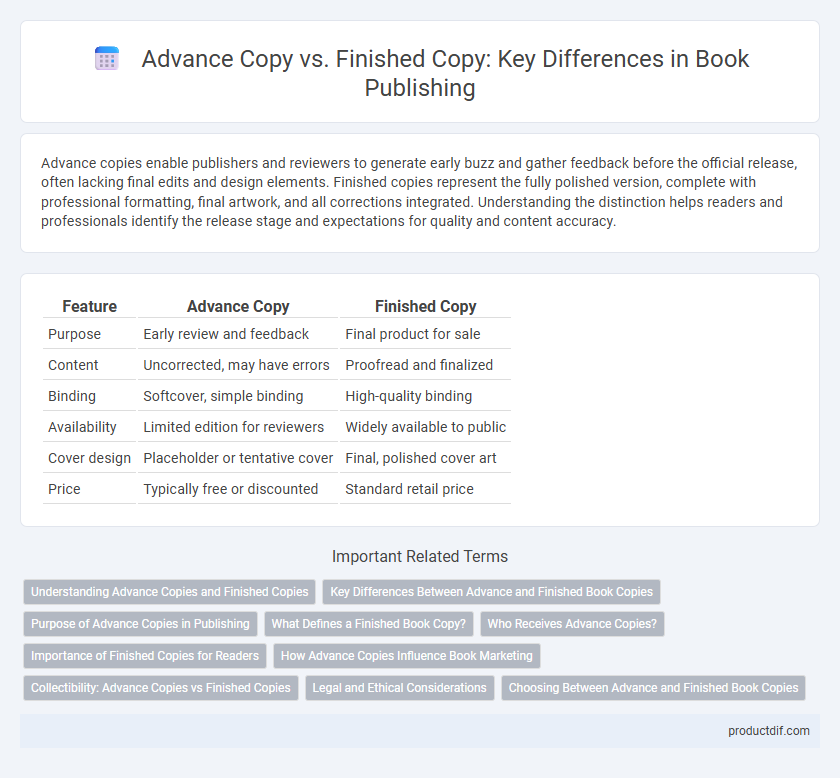Advance copies enable publishers and reviewers to generate early buzz and gather feedback before the official release, often lacking final edits and design elements. Finished copies represent the fully polished version, complete with professional formatting, final artwork, and all corrections integrated. Understanding the distinction helps readers and professionals identify the release stage and expectations for quality and content accuracy.
Table of Comparison
| Feature | Advance Copy | Finished Copy |
|---|---|---|
| Purpose | Early review and feedback | Final product for sale |
| Content | Uncorrected, may have errors | Proofread and finalized |
| Binding | Softcover, simple binding | High-quality binding |
| Availability | Limited edition for reviewers | Widely available to public |
| Cover design | Placeholder or tentative cover | Final, polished cover art |
| Price | Typically free or discounted | Standard retail price |
Understanding Advance Copies and Finished Copies
Advance copies are early versions of books distributed prior to the official release date to generate reviews, publicity, and feedback, often lacking final edits, cover art, or formatting. Finished copies represent the final, fully proofread, and formatted editions available to the general public, reflecting the author's complete vision and publisher's quality standards. Understanding the distinctions between advance and finished copies is essential for reviewers, booksellers, and collectors to gauge content accuracy and production quality.
Key Differences Between Advance and Finished Book Copies
Advance copies of books, also known as advance reading copies (ARCs), are pre-publication versions distributed to reviewers, bookstores, and media for early feedback and promotion, often lacking final editing and polished design. Finished copies are the fully edited, proofread, and formatted versions of the book released for public sale, containing final cover art and layout approved by the publisher. Key differences include the level of content refinement, print quality, and distribution purpose, with ARCs serving marketing and review functions prior to the official release of finished copies.
Purpose of Advance Copies in Publishing
Advance copies, also known as advance reader copies (ARCs), are distributed before a book's official release to generate early reviews, build buzz, and secure media coverage. These pre-publication versions help publishers gauge reader feedback and adjust marketing strategies accordingly. Unlike finished copies, ARCs often lack final edits and polished design, emphasizing their role in promotional efforts rather than retail sale.
What Defines a Finished Book Copy?
A finished book copy represents the final, polished version of a manuscript, incorporating all edits, design elements, and formatting tailored for publication. It includes finalized cover art, typeset pages, and corrected proofs, ensuring error-free content ready for distribution. Unlike advance copies, finished copies fully reflect the author's and publisher's intended presentation and quality standards.
Who Receives Advance Copies?
Advance copies of books are primarily distributed to reviewers, booksellers, librarians, and media outlets to generate early buzz and secure promotional opportunities before the official launch. Authors and publishing insiders often receive these pre-publication proofs to provide feedback and endorsements. Marketing teams rely on advance copies to organize pre-release campaigns and secure book reviews that boost visibility upon release.
Importance of Finished Copies for Readers
Finished copies provide readers with the complete, polished version of a book, ensuring all edits, design elements, and formatting are finalized for a smooth reading experience. Unlike advance copies, finished copies contain the final content free of errors and inconsistencies, offering the author's true vision without compromise. Access to finished copies enhances reader satisfaction and preserves the integrity of the narrative as intended by the author and publisher.
How Advance Copies Influence Book Marketing
Advance copies, often referred to as ARCs (Advance Reader Copies), play a critical role in book marketing by generating early buzz and garnering reviews before the official publication date. These early copies enable publishers and authors to secure endorsements, media coverage, and influence bestseller lists through pre-release reader engagement. By creating anticipation and allowing influencers, critics, and readers to share feedback, advance copies significantly amplify a book's visibility and sales momentum upon launch.
Collectibility: Advance Copies vs Finished Copies
Advance copies, also known as ARCs (Advance Reader Copies), hold significant collectibility due to their rarity and unique status as pre-publication editions. Finished copies, being the final retail versions, are more widely available but often lack the exclusive appeal of advance copies. Collectors prioritize advance copies for signed editions, errors, or unique design elements not present in finished copies, boosting their market value.
Legal and Ethical Considerations
Advance copies, also known as ARCs (Advance Review Copies), must be clearly marked to distinguish them from finished copies to avoid copyright infringement and unauthorized distribution. Publishers and authors have legal obligations to protect intellectual property rights while ensuring ARCs are not sold or widely distributed before the official release date. Ethically, careful handling of advance copies fosters trust between authors, publishers, reviewers, and readers by preventing spoilers and maintaining the book's market value.
Choosing Between Advance and Finished Book Copies
Choosing between advance copies and finished book copies depends on the purpose of distribution and target audience. Advance copies, often called ARCs (Advance Reader Copies), are uncorrected proofs sent to reviewers, influencers, and booksellers to generate early buzz and gather feedback before the final release. Finished copies feature the final edited content, cover design, and formatting, making them ideal for general retail sales and gifts.
Advance Copy vs Finished Copy Infographic

 productdif.com
productdif.com